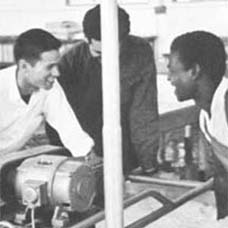December 28, 2004: Headlines: COS - Malawi: Midwifery: Babies: Delaware Online: Dorinda Dove had experience providing traditional nursing care to children and other patients. It wasn't until she was a Peace Corps volunteer in Malawi, Africa, and worked with a midwife that she learned there was a different way to bring children into the world
Peace Corps Online:
Directory:
Malawi:
Peace Corps Malawi :
The Peace Corps in Malawi:
December 28, 2004: Headlines: COS - Malawi: Midwifery: Babies: Delaware Online: Dorinda Dove had experience providing traditional nursing care to children and other patients. It wasn't until she was a Peace Corps volunteer in Malawi, Africa, and worked with a midwife that she learned there was a different way to bring children into the world
Dorinda Dove had experience providing traditional nursing care to children and other patients. It wasn't until she was a Peace Corps volunteer in Malawi, Africa, and worked with a midwife that she learned there was a different way to bring children into the world

Dorinda Dove had experience providing traditional nursing care to children and other patients. It wasn't until she was a Peace Corps volunteer in Malawi, Africa, and worked with a midwife that she learned there was a different way to bring children into the world
Midwife crucial in birthing experiences
By JENNIFER GOLDBLATT / The News Journal
12/28/2004
Caption: Dorinda Dove, a certified nurse midwife at The Birth Center in Wilmington, says she enjoys being a part of her patients' lives and "sharing one of the highest days of people's lives." Dove also said, "Labor has to be respected for what it is and not controlled and directed so much." The News Journal/JENNIFER CORBETT
Dorinda Dove had experience providing traditional nursing care to children and other patients. It wasn't until she was a Peace Corps volunteer in Malawi, Africa, and worked with a midwife that she learned there was a different way to bring children into the world.
Dove went back to school and became a certified nurse midwife.
Since 1995, Dove has worked for The Birth Center in Wilmington, an independent, freestanding facility with four certified nurse midwives and seven registered nurses. The center is a half-block from St. Francis Hospital in case an emergency or complication occurs during pregnancy or labor. It is licensed each year by the state and accredited every three years by the national Commission of Accreditation of Birth Centers.
Dove, 49, recently spoke with The News Journal about her work.
Why do people turn to a midwife?
I think that people come to us when they want a more personalized experience. The first visit is an hour long, and the subsequent visits are about 30 minutes long. They get a lot of attention. We look at the whole person, meet the other family members and do a lot of teaching. One of the reasons I think it works so well is that women are taking responsibility for taking good care of themselves, eating well and doing all the right things to optimize the chances of staying in a low-risk pregnancy with normal labor and no problems. People come to us when they want a lot more control over what happens during labor. Someone might come to a midwife because they want to be out of a hospital setting.
If women would just look at the options and make decisions ahead of time about what they want in a birth setting in terms of things like pain management, they are going to come out of labor feeling like they got what they wanted. Too many people don't look at the options and end up feeling somehow dissatisfied.
What kind of training did you have?
My background was in pediatric nursing and public health. I had a bachelor's of science in nursing from the University of Delaware. When I was in the Peace Corps in Malawi and briefly worked with an African midwife, I got very excited about the thought of doing this kind of work. I got back to the States and got experience in maternity nursing and decided that I wanted to go to midwifery school. I went to Baylor School of Medicine. At the time, they had a certificate program. Then I went on to get a master's degree in nurse midwifery at SUNY [The State University of New York] Stonybrook.
What kind of prenatal care does a midwife provide?
All the prenatal care is pretty standardized among midwives and OB-GYNs. We see [the patients] the same number of times and get the basic things monitored, like the baby's growth, the woman's blood pressure, the weight, the baby's heartbeat and monitoring any sugar and protein in the urine.
What is an example of how the care during childbirth that you offer is different from a traditional doctor?
We use intermittent, hand-held Dopplers to monitor the baby's heartbeat instead of a continuous fetal monitor. The studies are conclusive that the outcomes are exactly the same. The downside of continuous monitoring is that the mother has to stay in bed strapped to the monitor. At The Birth Center, we use a little, hand-held Doppler that allows the woman to be moving around. That can help the labor progress better. When she's moving around, she can cope with the pain better, and it facilitates the body's passage through the pelvis.
People can invite whoever they want to be a part of the birth experience or to be close by. We have Jacuzzi tubs in order to help relax them and help them feel on top of pain.
How do you work with an OB-GYN?
The certified nurse midwife handles all the pre- and post-partum care and works with the registered nurses here. The doctor we work with, Dr. Michael Cooksey, has his own practice in North Wilmington. He is just a phone call away. If we have a situation where a woman needs to go to the hospital, he would meet us there and assume care because in Delaware hospitals nurse midwives don't have privileges to deliver babies there.
What do you like about your job?
I just love being part of what's such a special time for families, getting to know people as intimately as we get to know people and sharing one of the highest days of people's lives. I just feel it's so important for women to have the option to have an out-of-hospital birth experience. Labor has to be respected for what it is and not controlled and directed so much. It's important that this option be available to women. And I feel good about being able to offer it. People appreciate a different kind of experience. It's not for everybody. You hear women all the time saying, "Just get me the epidural," and that's fine. They know what they want. But I think it's important to figure that out ahead of time and gather information about that. I think that's more empowering for people.
Contact Jennifer Goldblatt at 324-2877 or jgoldblatt@delawareonline.com.
ABOUT THE CAREER
There are approximately 7,000 nurse midwives in clinical practice in the United States, according to the American College of Nurse Midwives. Due to the variety of practice settings and geographic differences, it is difficult to determine the average salary for midwives, but a 2001 survey published in the Journal of Midwifery & Women's Health reported that, in 1999, the average salary ranged from $60,000 to $69,000.
Certified nurse midwives are licensed health care practitioners who are trained in primary care, gynecologic care, pregnancy, labor, birth and newborn care. They specialize in providing care for normal pregnancies and labor with a focus on preventing complications.
Midwives also provide Pap smears, mammograms and testing for sexually transmitted diseases.
They stress holistic management, using complementary and alternative techniques and tout a comparatively low rate of Caesarean sections. Just 4 percent to 7 percent of births under the care of certified nurse midwives end up having to be done by C-section, compared with 26 percent of births for women getting traditional care, according to the American College of Certified Nurse Midwives.
Midwives do not care for women with high-risk pregnancies, including cases where twins are expected, where the mother has chronic high blood pressure, diabetes or the baby has a heart defect. Midwives typically refer cases to obstetricians and gynecologists if complications arise.
Most midwives work in hospitals, but others work in settings that offer a home-like atmosphere.
About 10 percent of vaginal births were attended by certified nurse midwives, according to the National Center for Health Statistics. For more information, go to www.midwife.org.
When this story was posted in December 2004, this was on the front page of PCOL:
 | The World's Broken Promise to our Children
Former Director Carol Bellamy, now head of Unicef, says that the appalling conditions endured today by half the world's children speak to a broken promise. Too many governments are doing worse than neglecting children -- they are making deliberate, informed choices that hurt children. Read her op-ed and Unicef's report on the State of the World's Children 2005. |
 | Our debt to Bill Moyers
Former Peace Corps Deputy Director Bill Moyers leaves PBS next week to begin writing his memoir of Lyndon Baines Johnson. Read what Moyers says about journalism under fire, the value of a free press, and the yearning for democracy. "We have got to nurture the spirit of independent journalism in this country," he warns, "or we'll not save capitalism from its own excesses, and we'll not save democracy from its own inertia." |
 | Is Gaddi Leaving?
Rumors are swirling that Peace Corps Director Vasquez may be leaving the administration. We think Director Vasquez has been doing a good job and if he decides to stay to the end of the administration, he could possibly have the same sort of impact as a Loret Ruppe Miller. If Vasquez has decided to leave, then Bob Taft, Peter McPherson, Chris Shays, or Jody Olsen would be good candidates to run the agency. Latest: For the record, Peace Corps has no comment on the rumors. |
 | The Birth of the Peace Corps
UMBC's Shriver Center and the Maryland Returned Volunteers hosted Scott Stossel, biographer of Sargent Shriver, who spoke on the Birth of the Peace Corps. This is the second annual Peace Corps History series - last year's speaker was Peace Corps Director Jack Vaughn. |
 | Charges possible in 1976 PCV slaying
Congressman Norm Dicks has asked the U.S. attorney in Seattle to consider pursuing charges against Dennis Priven, the man accused of killing Peace Corps Volunteer Deborah Gardner on the South Pacific island of Tonga 28 years ago. Background on this story here and here. |
Read the stories and leave your comments.

Some postings on Peace Corps Online are provided to the individual members of this group without permission of the copyright owner for the non-profit purposes of criticism, comment, education, scholarship, and research under the "Fair Use" provisions of U.S. Government copyright laws and they may not be distributed further without permission of the copyright owner. Peace Corps Online does not vouch for the accuracy of the content of the postings, which is the sole responsibility of the copyright holder.
Story Source: Delaware Online
This story has been posted in the following forums: : Headlines; COS - Malawi; Midwifery; Babies
PCOL15655
91
.
hello dear dorinda dove
I'm nazi karimi a midwifery schollarship MD in Iran TABRIZ UNIVERSITY I want know more about new methods that midwifes use for bring children to the world please discribe me new methods or newtools that use in Europ
THANKS A LOT*











